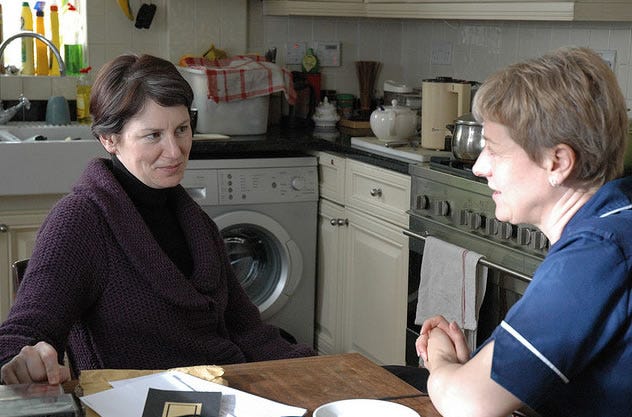the sleeping beauty of east finchley
Short Film, 2010, 3.5 stars
Written and Directed: Séamus Rea
The Sleeping Beauty of East Finchley is 50 minutes of very sweet and uplifting filmmaking, especially if you're the kind of person who appreciates a good BBC drama or two, a bit of choral music, or are just the romantic sort.
The film is the lovely story of Joan, a middle-age woman living in England who divides her time between her bookkeeping job and taking care of her invalid mother. She's exhausted and worn down, but she has one bright light in her life that sustains her - her love of music and her amazing singing voice.
It should be amazing too, with Joan being played by West End songstress Josie Walker (Phantom of the Opera). She's not a bad actress either. Walker gets Joan's angst and edge-of-depression look just right, enough to feel for Joan but never enough so that it feels Joan is asking for pity, because she isn't. She's just living her life how it is without complaint, and is wholly unprepared for the shake-up her world is about to get.
Joan is discovered singing along to a CD in her kitchen by her mother's day nurse, Pat (Ruth James), who falls instantly and palpably in love with the hapless Joan. Pat, it turns out, is a member of a choir called the Friends of Dusty (yes, I laughed) and invites Joan along to sing with them. Joan is initially reluctant, but she longs to sing, so she agrees.
The Friends of Dusty, as you can imagine, turn out to be a lesbian choir, and when Joan discovers it her Catholic guilt arrives to knock her already-ailing self esteem to the ground. She runs from the choir, and from Pat, into the clutches of her awful local church choir. The horridness of this just serves to convince her that she needs to give the Friends of Dusty, and her friendship with Pat, another chance. The story that then unfolds between the two women, one openly gay and mourning the death of her lover to cancer some years before, and one who has never really allowed herself to live, is really somewhat magical.
It was all a bit twee in parts though, especially towards the end, but there were other moments when the film got it exactly right. For example, a scene where the two women share Pat's tragic history in the car stood out for me as wonderfully poignant, but not over-sentimentalised.
It also has a tendency to sacrifice what could have been more interesting and in-depth storytelling opportunities in favour of extended choir scenes which served to show off the choir's (admittedly gorgeous) singing voices and Joan's love of music, but they went on much too long. When you have music that good though I can see how it would be really hard to leave any of it on the cutting room floor.
Hats off to the filmmakers for exploring such utterly uncommercial territory. After all, there's not much call for touchy-feely films about older women falling gently in love without the mad passion that usually accompanies coming out stories. I would have given a lot for just one kiss though, as one of the lingering fallacies around older women on film is their desexualisation.
Full disclosure - I'm grateful to the lovely people over at Cheek2Cheek productions in the UK for sending me the screener. If you're interested in this film you should check out their website at www.cheek2cheekproductions.co.uk.



